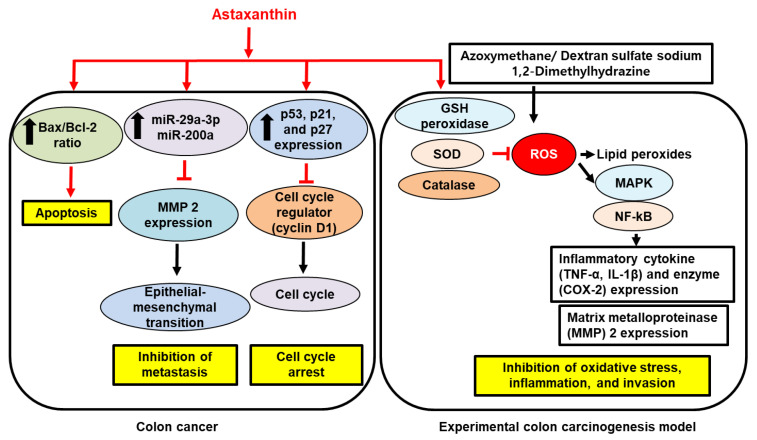Figure 4.
The inhibitory effect of astaxanthin on proliferation, metastasis, and oxidative stress-mediated inflammation and invasion in colon cancer development and progression. In colon cancer cells, astaxanthin increases Bax/Bcl-2 ratio, resulting in apoptosis. Astaxanthin increases micro RNA (miR)-29a-3p and miR-200a which inhibits matrix metalloproteinase (MMP) 2 expression that mediates epithelial-mesenchymal transition. Astaxanthin stimulates expression of tumor suppressor p53, p21, and p27 that inhibits the expression of cell cycle regulator cyclin D1, leading to cell cycle arrest. In experimental colon carcinogenesis model, induced by treatment of azoxymethane/dextran sulfate sodium or 1,2 dimethylhydrazine, astaxanthin increased glutathione (GSH) peroxidase, superoxide dismutase (SOD), and catalase which reduces reactive oxygens species (ROS) and production of lipid peroxides. Thus, astaxanthin suppresses ROS-mediated activation of mitogen-activated protein kinases (MAPK) and nuclear factor-κB (NF-κB) and inhibits expression of inflammatory cytokines tumor necrosis factor-α (TNF-α) and interleukin (IL)-1β, inflammatory enzyme cyclooxygenase-2 (COX-2), and MMP2. Therefore, astaxanthin inhibits inflammation and invasion by reducing ROS levels in the pathogenesis of colon cancer development. Inhibit,  ; increase,
; increase,  . Red arrows represent the effects of astaxanthin.
. Red arrows represent the effects of astaxanthin.

